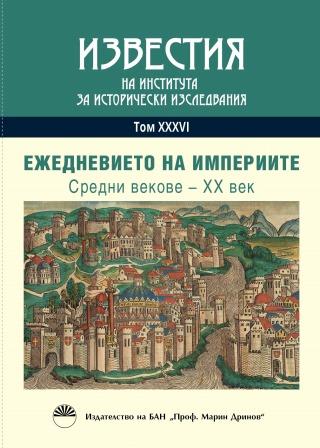Ежедневието на българите край Босфора през XIX век между традициите и модерността
The Daily Life of the Bulgarians Near the Bosphorus during the Revival between the Tradition and the Contemporary
Author(s): Plamen BozhinovSubject(s): History, Local History / Microhistory, Modern Age, 18th Century, 19th Century, The Ottoman Empire
Published by: Институт за исторически изследвания - Българска академия на науките
Keywords: Constantinople; Tsarigrad Bulgarians / Bulgarians in Istanbul; everyday life; Bulgarian National Revival; traditions; modernization
Summary/Abstract: Due to a number of factors during the era of the Bulgarian National Revival, Istanbul/Constantinople gradually became the informal “capital” of the Bulgarians. It is for this reason that the issue of the everyday life during weekdays and holidays of the Bulgarian settlers in the first and most populous city in the Ottoman Empire has its place in the bigger topic of the everyday life in the Empires. The topic of the present study is interesting primarily in that it provides an opportunity to trace over a long period of time how the transition from a medieval, traditional and patriarchal society to an early modern, more dynamic and open society is carried out in the everyday life of the numerous Bulgarian settlers near the Bosphorus and the Golden Horn. Based on sources and literature of different origins and nature, the dynamics of the initial phase of change in the everyday life is presented both in regards to the representatives of the community elite, as well as to the wider strata of the people. In the exhibition, the social processes that are the focus of attention, are traced in terms of the broad historical background of the events taking place in different ethnic and religious communities and in different spheres in the life of the Ottoman capital in the 18th and 19th centuries. Special emphasis in the study is put on the way of formation, number and structure of the Bulgarian colony in Constantinople, as well as on the changes that are taking place in it with the upcoming modernization of the Bulgarian society and the Ottoman Empire as a whole. While in the 18th century voynuks, drovers, carters and gardeners were the majority among the Bulgarians near the Bosphorus, after the second quarter of the 19th century the variety of professions expanded considerably and merchants, craftsmen and intellectuals took the main place. Particular attention is paid to the clash between the old and the new in the daily life, in the clothing and in the manners of the Bulgarians of Constantinople. While the majority of small traders, craftsmen and peasants retain more of the features of the patriarchal way of life, the wealthier merchants, bankers, employees in offices, as well as intellectuals, who have better financial opportunities are mainly the bearers of the new, modern and fashionable. Mutual assistance between the individual members and groups in the Bulgarian colony, the organization of work and the traditional holiday rituals are also important elements that complement, without being the main focus of the general picture of the everyday life presented in the study. From Constantinople start many modern trends in clothing, architecture, furniture, food, manners and customs, which changed the lives of people in the Bulgarian lands during the 19th century.
Journal: Известия на Института за исторически изследвания
- Issue Year: 36/2021
- Issue No: 1
- Page Range: 106-150
- Page Count: 45
- Language: Bulgarian
- Content File-PDF

